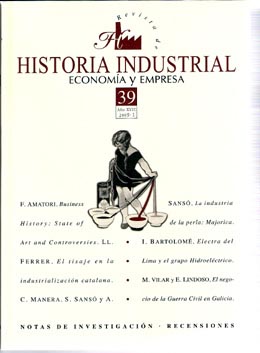Industrial benefits. The firm Berenguer and Cia. of Artés in Catalan industrialization
Keywords:
Weaving, Industrial Accounting, Industrial Benefits, Catalan Bourgeoisie.Abstract
This paper analyses, firstly, the role of weaving in Catalan industrialization. Around 1840, after the mechanization of spinning, there was an expansion of manual weaving in the form of weaving mills, some of which evolved towards mechanization, whereas others kept producing fabrics difficult to mechanize. Secondly, on the basis of an analysis of the family firm Berenguer in the town of Artés, the paper shows the high accumulation potential of the textile industry, as this family of simple hand weavers in 1840 ended up joining the Catalan bourgeoisie in the early twentieth century. Studies on profits in the textile industry have usually reported low profits, while this case study shows that the weaving industry was extremely profitable in the last third of the nineteenth century, allowing a family from a rural village to establish a fully mechanized factory in Artés, and an industrial “colony” in Cabrianes and to live with the luxury of the Catalan bourgeoisie in Barcelona.Downloads
Downloads
Published
How to Cite
Issue
Section
License
The author assigns all rights to the publisher. Creative Commons
The author who publishes in this journal agrees to the following terms:
- The author assigns all intellectual property rights exclusively to the publisher for the entire duration of the applicable intellectual property rights.
- The publisher will distribute the texts under the Creative Commons Attribution License, which allows others to share the work, provided that they acknowledge the authorship, its initial publication in this journal, and the conditions of the license.





